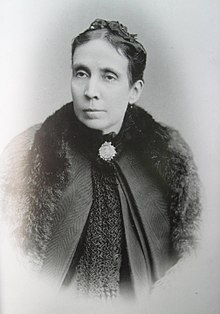Teresa González de Fanning
Teresa González de Fanning | |
|---|---|
 | |
| Born | 12 August 1836 Nepeña District |
| Died | 7 April 1918 (aged 81) Miraflores District, Lima |
| Language | Spanish |
| Nationality | Peru |
| Genre | Journalist, Educator |
Teresa González de Fanning (Nepeña District, Ancash Region, Peru, 12 August 1836 - Miraflores District, Lima, 7 April 1918) was a Peruvian writer and journalist notable for her activism in the education of women. She founded the Liceo Fanning (1881), a women's college, where she implemented her educational approaches.[1]
A collection of her articles, which had been published in El Comercio, were compiled in a booklet entitled Female Education (1898).[2] It was highly critical about women's education, which till then, was exclusively geared to prepare for marriage and motherhood. Gonzalez rejected this type of curriculum, promoting in its place the study of music, writing and mathematics as broader preparation with a practical connotation. She favored job training which would provide a source of income, allowing women to emancipate themselves from dependence on a husband. At lower levels, she suggested a more practical life skills education to learn a trade. On another level, she described a more enlightened education, within scientific and philosophical disciplines. Her views were recognized as a precursor to modern educational programs for women.
Selected works
- Ambición y abnegación (1886)
- Regina (1886)
- Indómita (1904)
- Roque Moreno (1904)
- Lucecitas (1893)
References
- ^ Historia del Perú: Procesos e instituciones (in Spanish). Editorial Juan Mejía Baca. 1980. p. 89.
- ^ Enríquez, Narda (2001). El Hechizo de las imágenes: estatus social, género y etnicidad en la historia peruana (in Spanish). Fondo Editor. de la Pontificia Universidad Católica del Perú. p. 228.
Further reading
- Basadre, Jorge: Historia de la República del Perú. 1822 - 1933, Octava Edición, corregida y aumentada. Vol. 9, Pg. 2166. Editada por el Diario "La República" de Lima y la Universidad "Ricardo Palma". Impreso en Santiago de Chile, 1998. Template:Es icon
- Denegri, Francesca: El Abanico y la Cigarrera. La primera generación de mujeres ilustradas en el Perú. Lima, 1996. Template:Es icon
- García y García, Elvira: La mujer peruana a través de los siglos (Tomo II). Lima, 1925. Template:Es icon
- Tauro del Pino, Alberto: Enciclopedia Ilustrada del Perú. Tercera Edición. Tomo 7. FER-GUZ. Lima, PEISA, 2001. ISBN 9972-40-156-1 Template:Es icon
- Varios autores: Grandes Forjadores del Perú. Lima, Lexus Editores, 2000. ISBN 9972-625-50-8 Template:Es icon
External links
